Burt A. The Evolution of the British Empire and Commonwealth From the American Revolution
Подождите немного. Документ загружается.

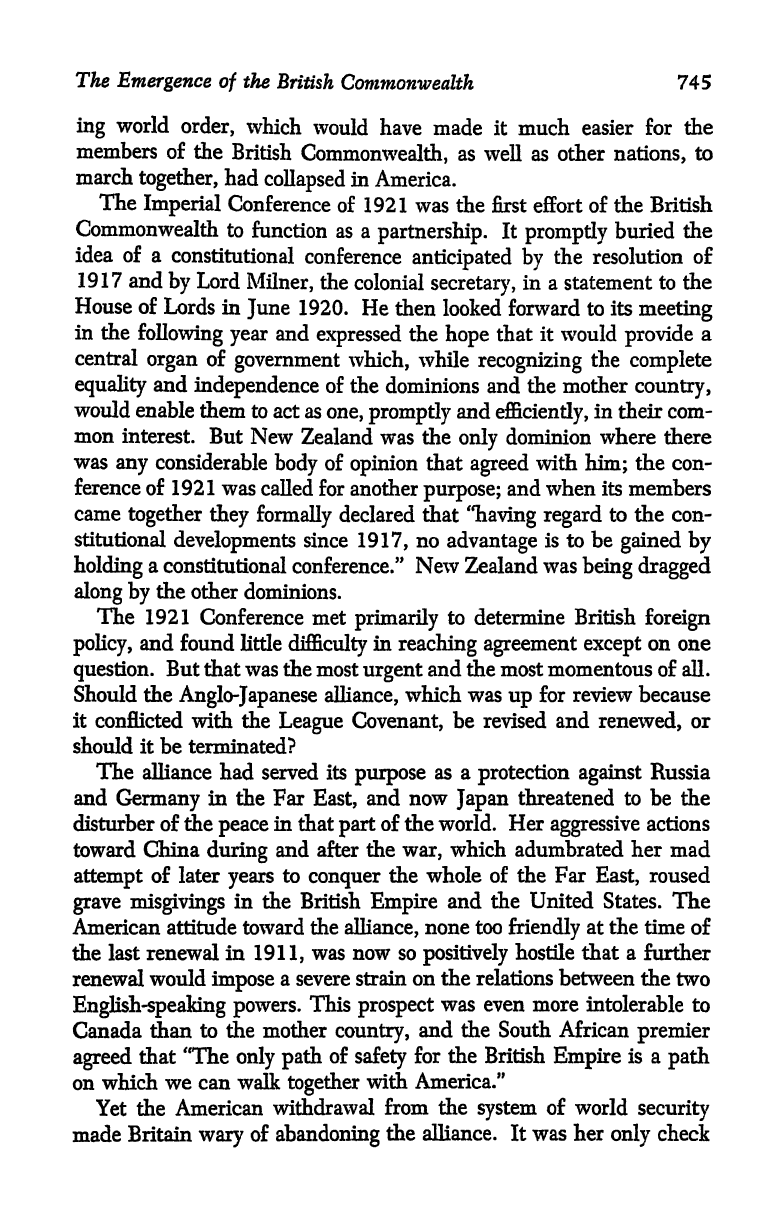
The
Emergence
of
the
British
Commonwealth
745
ing
world
order,
which
would
have
made it
much
easier
for the
members
of
the
British
Commonwealth,
as
well
as
other
nations,
to
march
together,
had
collapsed
in
America.
The
Imperial
Conference
of
1921
was the first
effort
of the
British
Commonwealth
to
function
as a
partnership.
It
promptly
buried
the
idea
of
a
constitutional
conference
anticipated by
the resolution
of
1917
and
by
Lord
Milner,
the
colonial
secretary,
in
a
statement
to
the
House
of
Lords
in
June
1920.
He
then
looked
forward to
its
meeting
in
the
following
year
and
expressed
the
hope
that
it
would
provide
a
central
organ
of
government
which,
while
recognizing
the
complete
equality
and
independence
of the
dominions and the
mother
country,
would
enable them
to
act as
one,
promptly
and
efficiently,
in
their
com-
mon
interest.
But
New
Zealand
was
the
only
dominion
where there
was
any
considerable
body
of
opinion
that
agreed
with
him;
the con-
ference
of
1921
was
called
for
another
purpose;
and when its members
came
together
they
formally
declared that
"having
regard
to the con-
stitutional
developments
since
1917,
no
advantage
is
to be
gained
by
holding
a
constitutional
conference."
New
Zealand
was
being dragged
along
by
the
other
dominions.
The 1921
Conference
met
primarily
to determine
British
foreign
policy,
and
found
little
difficulty
in
reaching
agreement
except
on
one
question.
But that was the
most
urgent
and
the most momentous of
all.
Should the
Anglo-Japanese
alliance,
which was
up
for review
because
it
conflicted with the
League
Covenant,
be revised and
renewed,
or
should
it
be terminated?
The
alliance
had
served
its
purpose
as a
protection
against
Russia
and
Germany
in the Far
East,
and now
Japan
threatened
to
be the
disturber
of
die
peace
in
that
part
of the world.
Her
aggressive
actions
toward China
during
and
after
the
war,
which adumbrated her
mad
attempt
of later
years
to
conquer
the whole
of the Far
East,
roused
grave misgivings
in the British
Empire
and
the United States.
The
American
attitude
toward
the
alliance,
none
too
friendly
at
the time
of
the last
renewal in
1911,
was
now
so
positively
hostile
that a
further
renewal
would
impose
a severe strain
on the
relations between
the
two
English-speaking
powers.
This
prospect
was
even more
intolerable
to
Canada
than
to the mother
country,
and
the South African
premier
agreed
that "The
only path
of
safety
for
the
British
Empire
is a
path
on which
we can walk
together
with America."
Yet
the
American
withdrawal
from
the
system
of
world
security
made
Britain
wary
of
abandoning
the
alliance.
It was
her
only
check
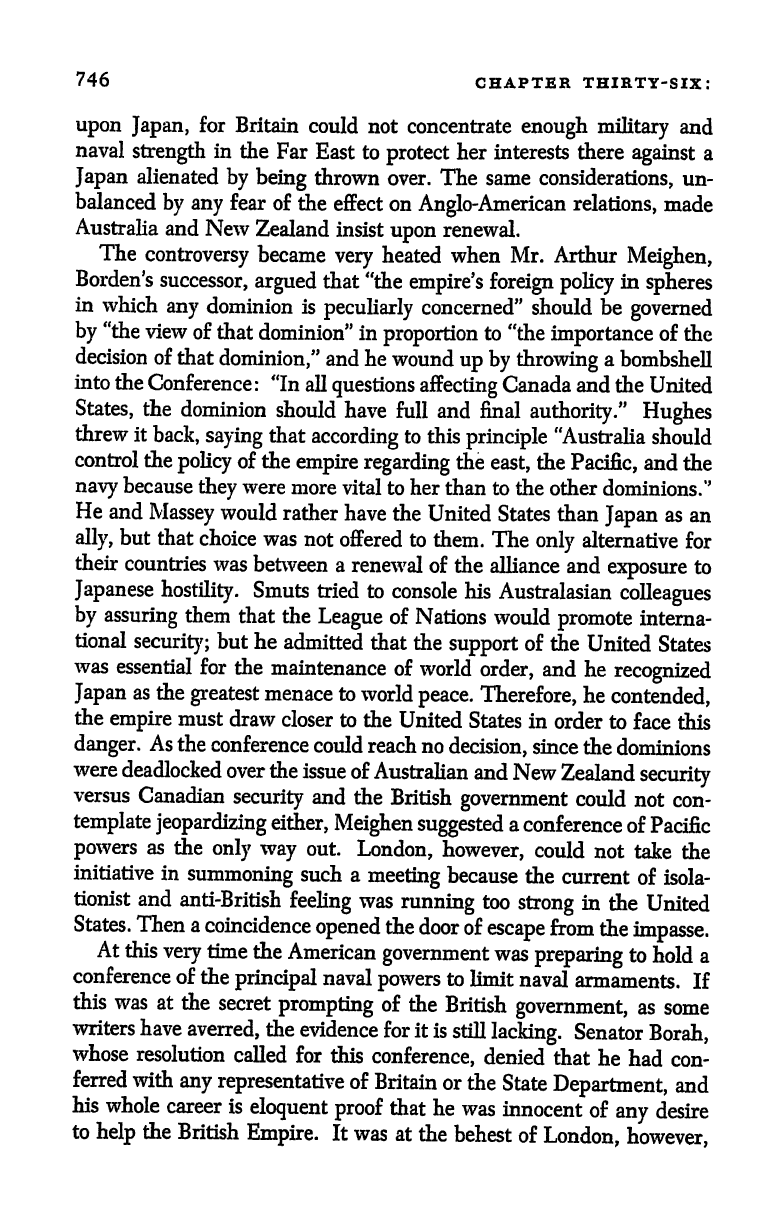
746
CHAPTER
THIRTY-SIX:
upon
Japan,
for
Britain
could not concentrate
enough military
and
naval
strength
in
the
Far
East
to
protect
her
interests there
against
a
Japan
alienated
by
being
thrown
over.
The same
considerations,
un-
balanced
by
any
fear
of
the
effect on
Anglo-American
relations,
made
Australia
and New
Zealand
insist
upon
renewal.
The
controversy
became
very
heated
when
Mr.
Arthur
Meighen,
Borden's
successor,
argued
that
"the
empire's
foreign policy
in
spheres
in
which
any
dominion
is
peculiarly
concerned" should be
governed
by
"the view
of
that
dominion" in
proportion
to
"the
importance
of
the
decision
of
that
dominion/'
and
he
wound
up by
throwing
a
bombshell
into
the
Conference: "In
all
questions
affecting
Canada
and the
United
States,
the
dominion
should have
full and final
authority."
Hughes
threw
it
back,
saying
that
according
to
this
principle
"Australia
should
control the
policy
of the
empire
regarding
the
east,
the
Pacific,
and
the
navy
because
they
were
more
vital to
her
than
to the
other
dominions."
He
and
Massey
would rather
have
the
United States than
Japan
as
an
ally,
but
that
choice
was
not offered to them.
The
only
alternative
for
their
countries
was
between a
renewal of the
alliance
and
exposure
to
Japanese
hostility.
Smuts
tried to
console his
Australasian
colleagues
by
assuring
them
that
the
League
of
Nations
would
promote
interna-
tional
security;
but
he
admitted that
the
support
of
the
United
States
was
essential for
the
maintenance
of
world
order,
and he
recognized
Japan
as
the
greatest
menace
to
world
peace.
Therefore,
he
contended,
the
empire
must
draw
closer
to the
United
States
in
order
to
face
this
danger.
As
the
conference
could reach
no
decision,
since
the
dominions
were
deadlocked over
the
issue of
Australian
and
New
Zealand
security
versus
Canadian
security
and the
British
government
could
not
con-
template
jeopardizing
either,
Meighen
suggested
a
conference of
Pacific
powers
as
the
only way
out.
London,
however,
could
not
take the
initiative
in
summoning
such
a
meeting
because
the
current
of
isola-
tionist
and
anti-British
feeling
was
running
too
strong
in
the
United
States. Then a
coincidence
opened
the
door
of
escape
from
the
impasse.
At
this
very
time
the
American
government
was
preparing
to
hold a
conference of
the
principal
naval
powers
to limit
naval
armaments.
If
this
was
at
the
secret
prompting
of
the
British
government,
as
some
writers
have
averred,
the
evidence
for it
is
still
lacking.
Senator
Borah,
whose
resolution
called for
this
conference,
denied
that
he
had
con-
ferred with
any
representative
of
Britain
or
the
State
Department,
and
his
whole
career
is
eloquent
proof
that
he
was
innocent
of
any
desire
to
help
the
British
Empire.
It
was
at
the
behest
of
London,
however,
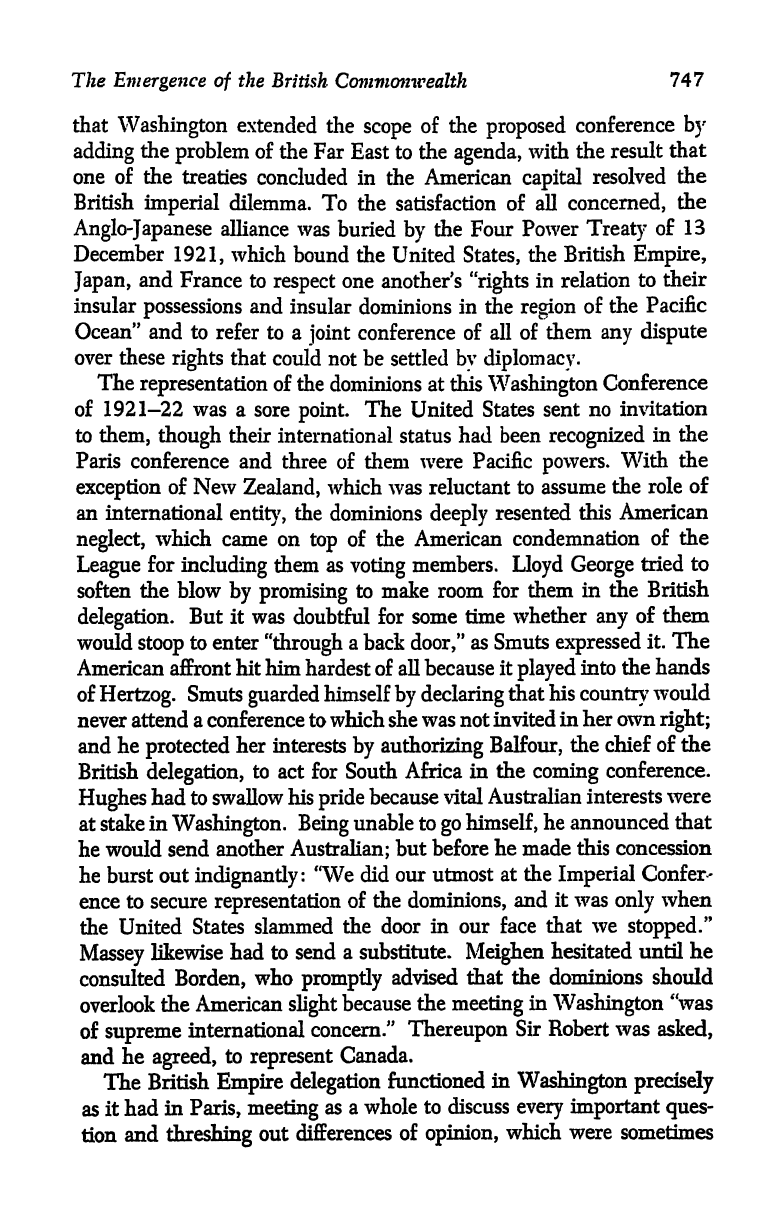
The
Emergence
of
the British
Commonwealth
747
that
Washington
extended the
scope
of
the
proposed
conference
by
adding
the
problem
of
the Far
East
to
the
agenda,
with
the
result
that
one
of the
treaties
concluded
in
the
American
capital
resolved
the
British
imperial
dilemma.
To the
satisfaction
of all
concerned,
the
Anglo-Japanese
alliance was
buried
by
the Four
Power
Treaty
of
13
December
1921,
which
bound the United
States,
the
British
Empire,
Japan,
and
France
to
respect
one
another's
"rights
in relation
to
their
insular
possessions
and insular
dominions
in
the
region
of
the
Pacific
Ocean"
and
to
refer to a
joint
conference
of all
of
them
any
dispute
over
these
rights
that
could
not
be
settled
by diplomacy.
The
representation
of the
dominions
at this
Washington
Conference
of 1921-22 was a
sore
point.
The
United
States
sent
no
invitation
to
them,
though
their
international status
had been
recognized
in the
Paris
conference
and
three
of
them
were
Pacific
powers.
With the
exception
of New
Zealand,
which was reluctant
to assume
the role
of
an
international
entity,
the
dominions
deeply
resented
this
American
neglect,
which
came on
top
of the
American
condemnation
of
the
League
for
including
them
as
voting
members.
Lloyd George
tried
to
soften
the
blow
by
promising
to
make room for
them
in the
British
delegation.
But it was
doubtful
for
some
time
whether
any
of
them
would
stoop
to
enter
"through
a
back
door,"
as Smuts
expressed
it. The
American
affront hit
him
hardest
of all
because
it
played
into
the
hands
of
Hertzog.
Smuts
guarded
himself
by declaring
that his
country
would
never
attend a conference to which she
was
not
invited
in her
own
right;
and
he
protected
her
interests
by authorizing
Balfour,
the chief
of the
British
delegation,
to act for
South
Africa in
the
coming
conference.
Hughes
had to swallow
his
pride
because
vital
Australian
interests were
at stake
in
Washington. Being
unable to
go
himself,
he
announced
that
he would send
another
Australian;
but
before
he
made
this concession
he
burst
out
indignantly:
"We did
our utmost
at the
Imperial
Confer-
ence
to
secure
representation
of the
dominions,
and
it
was
only
when
the United
States
slammed
the door
in
our
face
that
we
stopped."
Massey
likewise
had to send
a
substitute.
Meighen
hesitated
until
he
consulted
Borden,
who
promptly
advised
that
the
dominions
should
overlook
the
American
slight
because
the
meeting
in
Washington
"was
of
supreme
international
concern."
Thereupon
Sir
Robert
was
asked,
and
he
agreed,
to
represent
Canada.
The
British
Empire delegation
functioned
in
Washington
precisely
as
it
had
in
Paris,
meeting
as
a whole
to
discuss
every important ques-
tion
and
threshing
out differences
of
opinion,
which
were
sometimes
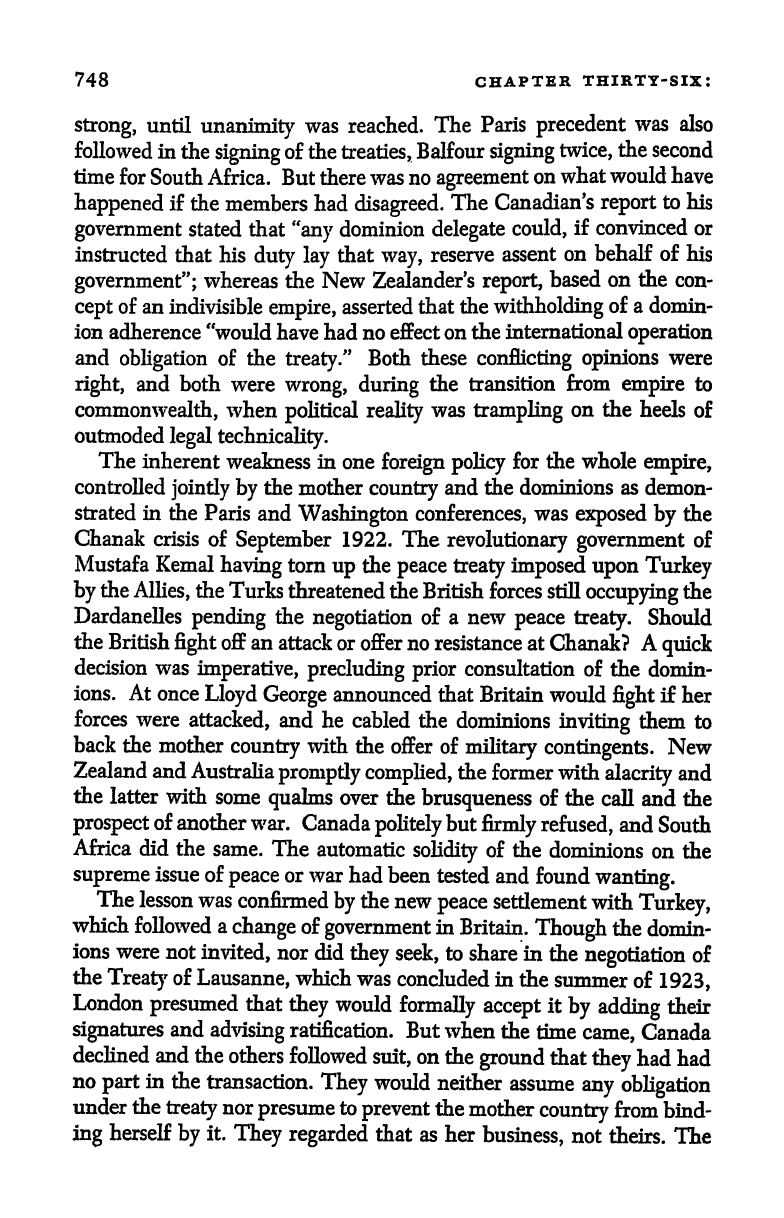
748
CHAPTER
THIRTY-SIX:
strong,
until
unanimity
was reached.
The
Paris
precedent
was
also
followed
in the
signing
of the
treaties,
Balfour
signing
twice,
the
second
time
for
South
Africa. But there
was no
agreement
on
what would
have
happened
if the
members had
disagreed.
The Canadian's
report
to
his
government
stated that
"any
dominion
delegate
could,
if
convinced or
instructed that
his
duty
lay
that
way,
reserve
assent
on behalf
of
his
government";
whereas the New Zealander's
report,
based
on the
con-
cept
of
an
indivisible
empire,
asserted
that the
withholding
of a
domin-
ion
adherence
"would have had no
effect on
the
international
operation
and
obligation
of the
treaty."
Both
these
conflicting
opinions
were
right,
and
both were
wrong, during
the
transition
from
empire
to
commonwealth,
when
political reality
was
trampling
on the
heels
of
outmoded
legal
technicality.
The
inherent
weakness in one
foreign
policy
for
the
whole
empire,
controlled
jointly
by
the mother
country
and
the dominions
as
demon-
strated in the
Paris
and
Washington
conferences,
was
exposed
by
the
Chanak
crisis
of
September
1922. The
revolutionary government
of
Mustafa
Kemal
having
torn
up
the
peace treaty imposed
upon
Turkey
by
the
Allies,
the
Turks
threatened
the British
forces still
occupying
the
Dardanelles
pending
the
negotiation
of
a new
peace
treaty.
Should
the British
fight
off
an
attack
or
offer
no resistance at
Chanak?
A
quick
decision was
imperative,
precluding
prior
consultation
of the domin-
ions.
At
once
Lloyd
George
announced that
Britain
would
fight
if her
forces
were
attacked,
and
he
cabled the
dominions
inviting
them
to
back
the
mother
country
with
the offer of
military
contingents.
New
Zealand
and Australia
promptly complied,
the
former with
alacrity
and
the
latter with
some
qualms
over
the
brusqueness
of
the
call
and
the
prospect
of
another war.
Canada
politely
but
firmly
refused,
and
South
Africa
did the
same.
The
automatic
solidity
of the
dominions on
the
supreme
issue
of
peace
or war
had been
tested and
found
wanting.
The
lesson was
confirmed
by
the new
peace
settlement
with
Turkey,
which
followed
a
change
of
government
in
Britain.
Though
the
domin-
ions were
not
invited,
nor did
they
seek,
to
share in
the
negotiation
of
the
Treaty
of
Lausanne,
which
was
concluded in
the
summer
of
1923,
London
presumed
that
they
would
formally
accept
it
by
adding
their
signatures
and
advising
ratification. But
when
the
time
came,
Canada
declined
and the
others
followed
suit,
on
the
ground
that
they
had had
no
part
in
the
transaction.
They
would neither
assume
any
obligation
under
the
treaty
nor
presume
to
prevent
the
mother
country
from
bind-
ing
herself
by
it.
They
regarded
that
as
her
business,
not
theirs. The
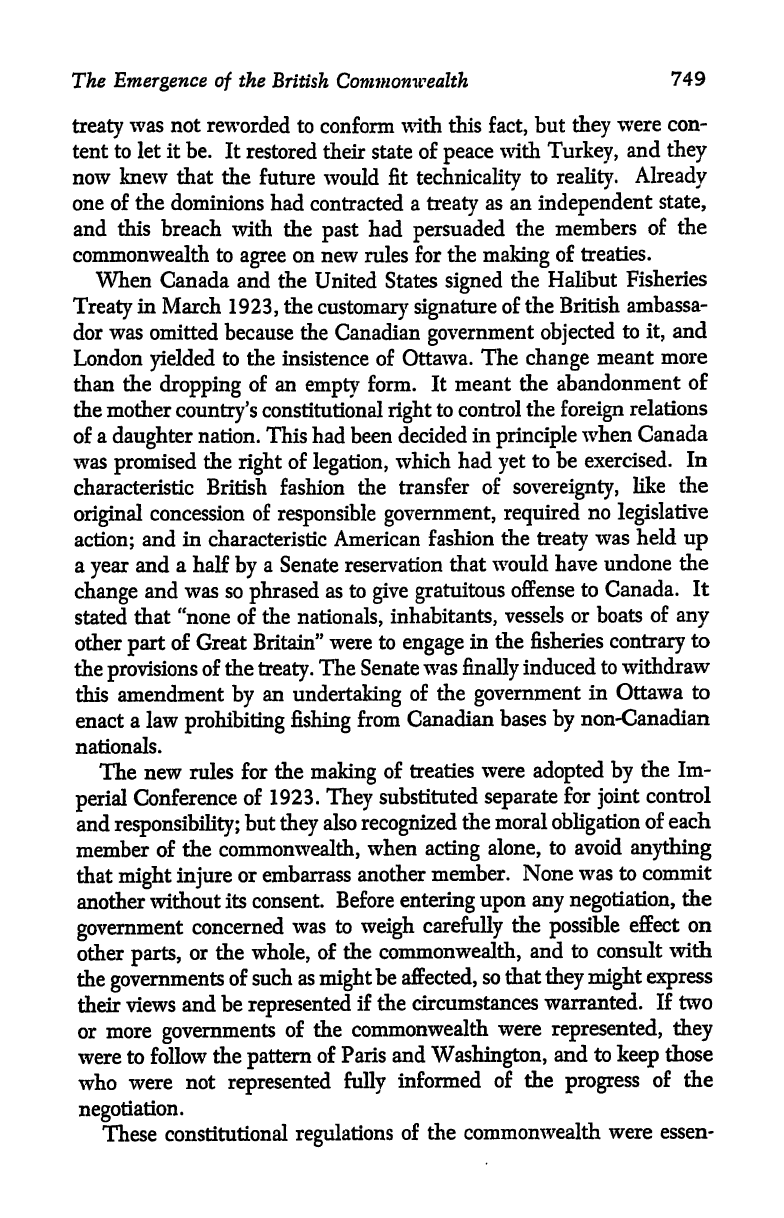
The
Emergence
of
the
British
Commonwealth
749
treaty
was not
reworded to
conform
with
this
fact,
but
they
were
con-
tent to let it
be.
It
restored
their
state
of
peace
with
Turkey,
and
they
now
knew that
the
future
would
fit
technicality
to
reality.
Already
one
of
the
dominions had
contracted
a
treaty
as
an
independent
state,
and
this
breach
with
the
past
had
persuaded
the
members
of
the
commonwealth
to
agree
on new rules for
the
making
of
treaties.
When
Canada
and the United States
signed
the Halibut
Fisheries
Treaty
in
March
1923,
the
customary signature
of
the
British
ambassa-
dor
was
omitted because the
Canadian
government
objected
to
it,
and
London
yielded
to
the
insistence of Ottawa.
The
change
meant
more
than
the
dropping
of
an
empty
form.
It
meant the
abandonment
of
the
mother
country's
constitutional
right
to control
the
foreign
relations
of
a
daughter
nation. This
had been
decided
in
principle
when
Canada
was
promised
the
right
of
legation,
which had
yet
to be
exercised.
In
characteristic
British fashion
the
transfer of
sovereignty,
like
the
original
concession
of
responsible
government,
required
no
legislative
action;
and
in
characteristic
American
fashion
the
treaty
was
held
up
a
year
and
a
half
by
a
Senate
reservation
that would
have
undone
the
change
and
was
so
phrased
as
to
give
gratuitous
offense
to Canada.
It
stated
that
"none
of
the
nationals,
inhabitants,
vessels
or
boats
of
any
other
part
of Great
Britain"
were to
engage
in
the
fisheries
contrary
to
the
provisions
of
the
treaty.
The Senate
was
finally
induced
to withdraw
this
amendment
by
an
undertaking
of the
government
in
Ottawa
to
enact
a law
prohibiting
fishing
from
Canadian
bases
by
non-Canadian
nationals.
The new
rules
for
the
making
of
treaties
were
adopted
by
the
Im-
perial
Conference
of
1923.
They
substituted
separate
for
joint
control
and
responsibility;
but
they
also
recognized
the
moral
obligation
of
each
member
of
the
commonwealth,
when
acting
alone,
to avoid
anything
that
might
injure
or embarrass
another
member.
None
was to
commit
another
without
its consent.
Before
entering
upon any
negotiation,
the
government
concerned
was to
weigh
carefully
the
possible
effect on
other
parts,
or the
whole,
of
the
commonwealth,
and
to
consult
with
the
governments
of such
as
might
be
affected,
so that
they
might
express
their
views
and
be
represented
if the
circumstances
warranted.
If two
or
more
governments
of
the commonwealth
were
represented,
they
were to
follow
the
pattern
of
Paris and
Washington,
and
to
keep
those
who
were
not
represented
fully
informed
of
the
progress
of
the
negotiation.
These constitutional
regulations
of
the
commonwealth
were
essen-
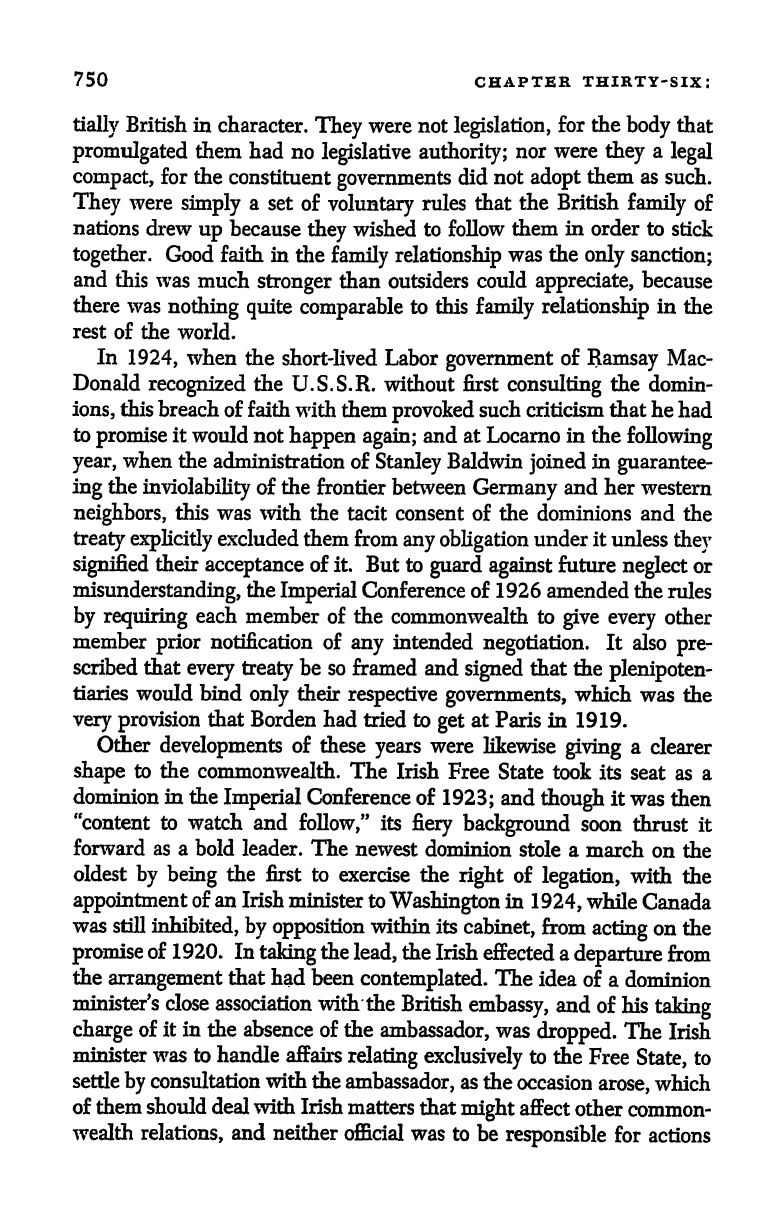
750
CHAPTER
THIRTY-SIX:
tially
British in
character.
They
were
not
legislation,
for
the
body
that
promulgated
them
had
no
legislative
authority;
nor
were
they
a
legal
compact,
for the
constituent
governments
did
not
adopt
them
as
such.
They
were
simply
a
set
of
voluntary
rules
that
the British
family
of
nations drew
up
because
they
wished
to follow
them
in
order
to
stick
together.
Good
faith
in the
family
relationship
was
the
only
sanction;
and
this
was
much
stronger
than outsiders
could
appreciate,
because
there
was
nothing
quite
comparable
to
this
family relationship
in
the
rest
of the
world.
In
1924,
when
the
short-lived Labor
government
of
Ramsay
Mac-
Donald
recognized
the
U.S.S.R. without
first
consulting
the
domin-
ions,
this breach
of faith
with them
provoked
such criticism that
he
had
to
promise
it
would not
happen
again;
and at Locarno
in
the
following
year,
when the
administration of
Stanley
Baldwin
joined
in
guarantee-
ing
the
inviolability
of
the
frontier between
Germany
and
her
western
neighbors,
this was
with the
tacit
consent of
the
dominions and
the
treaty
explicitly
excluded them
from
any
obligation
under
it
unless
they
signified
their
acceptance
of
it.
But to
guard against
future
neglect
or
misunderstanding,
the
Imperial
Conference of 1926
amended
the
rules
by
requiring
each
member of the
commonwealth to
give every
other
member
prior
notification
of
any
intended
negotiation.
It also
pre-
scribed
that
every
treaty
be so
framed and
signed
that the
plenipoten-
tiaries
would
bind
only
their
respective
governments,
which
was
the
very
provision
that
Borden
had
tried to
get
at
Paris in 1919.
Other
developments
of
these
years
were
likewise
giving
a
clearer
shape
to the
commonwealth.
The Irish
Free
State
took its
seat
as
a
dominion in the
Imperial
Conference of
1923;
and
though
it
was then
"content to watch
and
follow,"
its
fiery
background
soon
thrust it
forward as a
bold leader.
The
newest
dominion
stole a
march
on
the
oldest
by
being
the
first to
exercise the
right
of
legation,
with the
appointment
of an
Irish
minister
to
Washington
in
1924,
while
Canada
was still
inhibited,
by
opposition
within its
cabinet,
from
acting
on the
promise
of 1920.
In
taking
the
lead,
the
Irish
effected a
departure
from
the
arrangement
that
had been
contemplated.
The
idea
of
a
dominion
minister's
close
association with
the
British
embassy,
and
of his
taking
charge
of
it
in
the absence
of
the
ambassador,
was
dropped.
The
Irish
minister was
to handle affairs
relating exclusively
to the
Free
State,
to
settle
by
consultation
with
the
ambassador,
as
the
occasion
arose,
which
of them should deal with Irish
matters
that
might
affect
other
common-
wealth
relations,
and neither
official was
to
be
responsible
for
actions
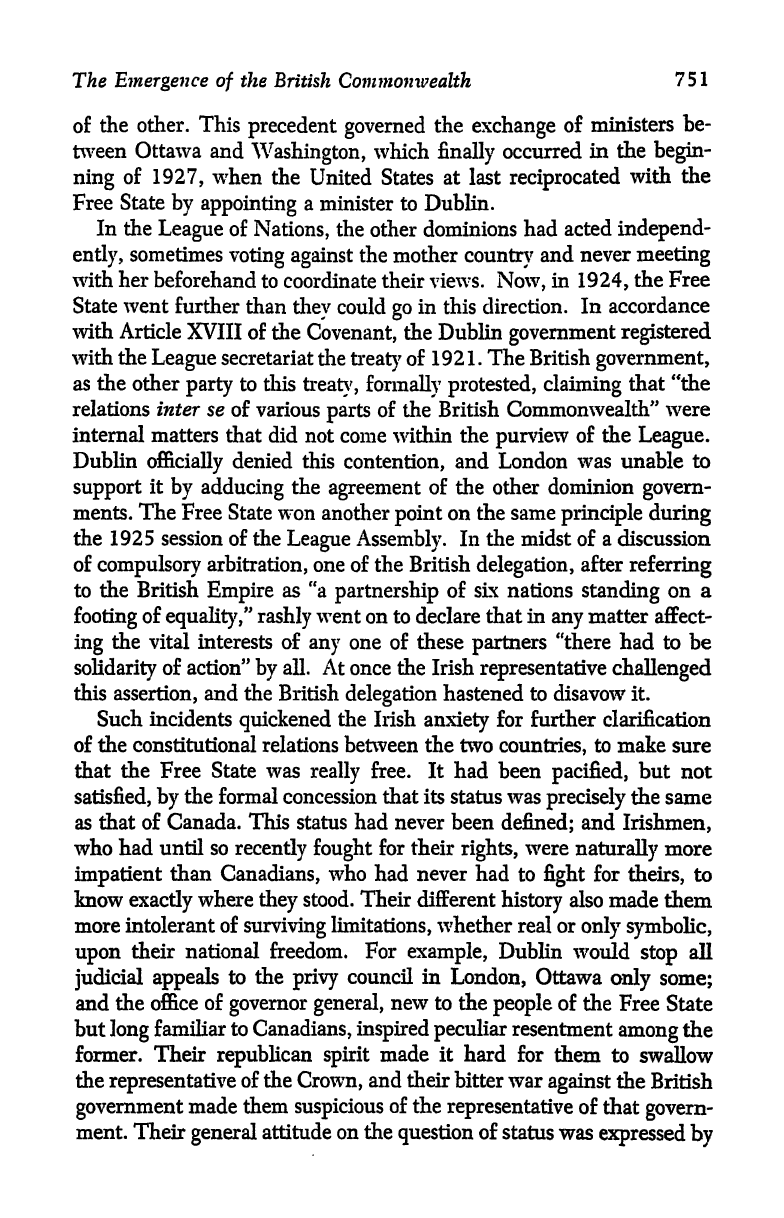
The
Emergence
of
the
British
Commonwealth
751
of
the
other. This
precedent
governed
the
exchange
of
ministers
be-
tween
Ottawa
and
Washington,
which
finally
occurred
in the
begin-
ning
of
1927,
when
the
United
States
at
last
reciprocated
with
the
Free
State
by
appointing
a
minister
to
Dublin.
In the
League
of
Nations,
the
other dominions
had
acted
independ-
ently,
sometimes
voting
against
the
mother
country
and
never
meeting
with her
beforehand
to coordinate
their views.
Now,
in
1924,
the Free
State
went
further
than
they
could
go
in this direction.
In
accordance
with
Article
XVIII of
the
Covenant,
the Dublin
government
registered
with
the
League
secretariat
the
treaty
of
1921. The
British
government,
as
the
other
party
to this
treat}',
formally protested,
claiming
that "the
relations
inter
se
of
various
parts
of the British
Commonwealth"
were
internal matters
that did not
come within
the
purview
of
the
League.
Dublin
officially
denied
this
contention,
and
London
was
unable to
support
it
by
adducing
the
agreement
of
the other
dominion
govern-
ments.
The Free State
won another
point
on the
same
principle
during
the 1925
session of the
League
Assembly.
In
the
midst of
a
discussion
of
compulsory
arbitration,
one
of
the British
delegation,
after
referring
to the British
Empire
as "a
partnership
of
six nations
standing
on
a
footing
of
equality," rashly
went
on to declare
that
in
any
matter
affect-
ing
the
vital interests of
any
one
of
these
partners
"there
had to be
solidarity
of action"
by
all.
At
once
the
Irish
representative
challenged
this
assertion,
and
the British
delegation
hastened to
disavow it.
Such
incidents
quickened
the
Irish
anxiety
for further clarification
of the
constitutional relations
between
the two
countries,
to make
sure
that
the Free
State was
really
free. It
had been
pacified,
but not
satisfied,
by
the
formal concession
that
its status was
precisely
the
same
as
that of
Canada.
This
status
had
never
been
defined;
and
Irishmen,
who
had until so
recently
fought
for
their
rights,
were
naturally
more
impatient
than
Canadians,
who
had
never had
to
fight
for
theirs,
to
know
exactly
where
they
stood. Their different
history
also
made them
more intolerant
of
surviving
limitations,
whether
real
or
only
symbolic,
upon
their
national freedom. For
example,
Dublin
would
stop
all
judicial
appeals
to
the
privy
council in
London,
Ottawa
only
some;
and
the office
of
governor
general,
new
to
the
people
of
the Free
State
but
long
familiar
to
Canadians,
inspired peculiar
resentment
among
the
former.
Their
republican
spirit
made it
hard
for
them
to
swallow
the
representative
of
the
Crown,
and
their
bitter war
against
the
British
government
made them
suspicious
of
the
representative
of that
govern-
ment. Their
general
attitude on the
question
of
status
was
expressed
by
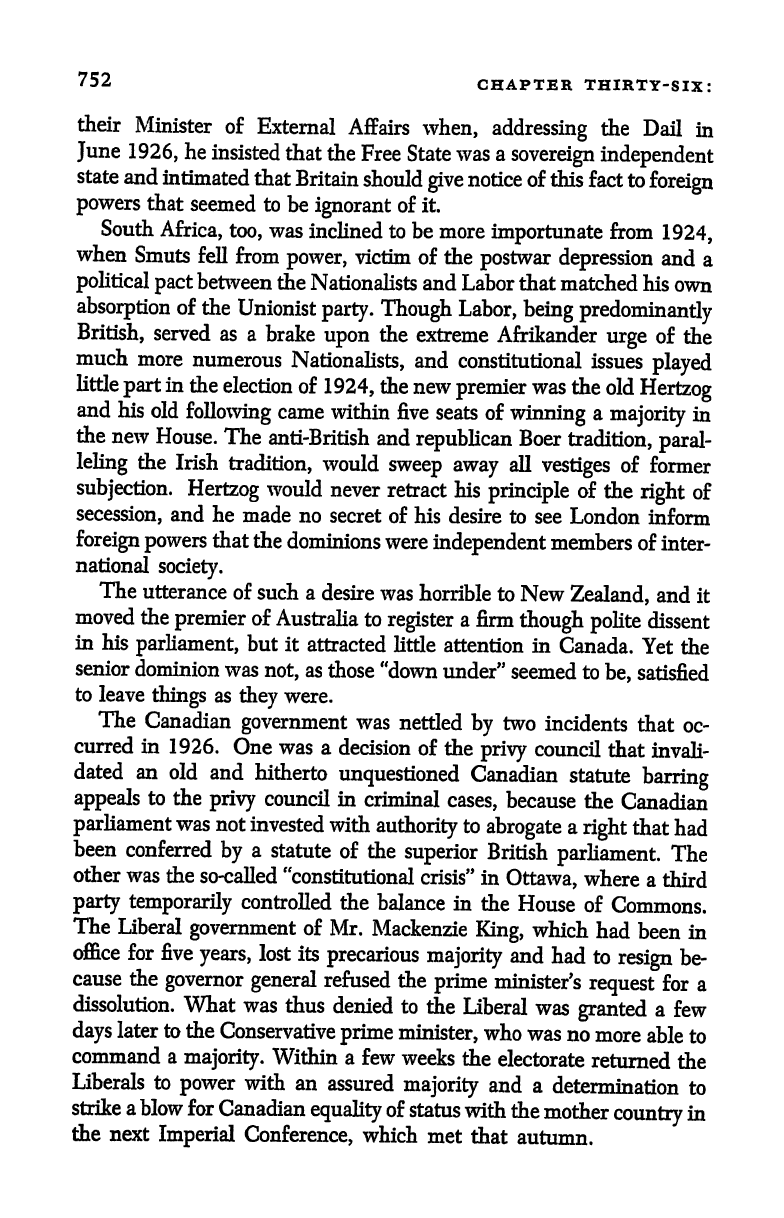
752
CHAPTER
THIRTY-SIX:
their
Minister
of
External Affairs
when,
addressing
the
Dail
in
June 1926,
he
insisted that
the
Free
State
was
a
sovereign
independent
state
and
intimated
that
Britain
should
give
notice
of
this fact
to
foreign
powers
that
seemed to
be
ignorant
of it.
South
Africa, too,
was
inclined
to be more
importunate
from
1924,
when
Smuts
fell
from
power,
victim
of the
postwar
depression
and
a
political
pact
between
the
Nationalists and
Labor
that
matched
his
own
absorption
of
the
Unionist
party.
Though
Labor,
being
predominantly
British,
served
as a
brake
upon
the extreme
Afrikander
urge
of
the
much
more
numerous
Nationalists,
and
constitutional
issues
played
little
part
in
the
election
of
1924,
the new
premier
was
the old
Hertzog
and
his
old
following
came
within
five seats
of
winning
a
majority
in
the
new
House.
The
anti-British
and
republican
Boer
tradition,
paral-
leling
the
Irish
tradition,
would
sweep away
all
vestiges
of
former
subjection.
Hertzog
would
never
retract
his
principle
of
the
right
of
secession,
and
he
made no
secret
of
his desire
to see
London
inform
foreign powers
that
the
dominions were
independent
members
of
inter-
national
society.
The
utterance of
such a
desire
was
horrible
to New
Zealand,
and
it
moved the
premier
of
Australia
to
register
a
firm
though polite
dissent
in
his
parliament,
but
it
attracted little
attention
in
Canada.
Yet
the
senior
dominion
was
not,
as
those
"down
under"
seemed to
be,
satisfied
to leave
things
as
they
were.
The
Canadian
government
was
nettled
by
two
incidents
that
oc-
curred in
1926.
One was
a
decision
of
the
privy
council
that
invali-
dated an
old
and
hitherto
unquestioned
Canadian
statute
barring
appeals
to the
privy
council in
criminal
cases,
because
the
Canadian
parliament
was
not
invested with
authority
to
abrogate
a
right
that
had
been
conferred
by
a
statute
of the
superior
British
parliament.
The
other
was
the
so-called
"constitutional
crisis"
in
Ottawa,
where a
third
party
temporarily
controlled
the
balance
in
the
House
of
Commons.
The
Liberal
government
of
Mr.
Mackenzie
King,
which
had
been
in
office for
five
years,
lost
its
precarious
majority
and
had
to
resign
be-
cause
the
governor
general
refused the
prime
minister's
request
for
a
dissolution.
What
was
thus
denied
to
the
Liberal
was
granted
a
few
days
later
to
the
Conservative
prime
minister,
who
was
no
more
able
to
command
a
majority.
Within
a
few
weeks
the
electorate
returned the
Liberals to
power
with
an
assured
majority
and
a
determination
to
strike
a
blow
for
Canadian
equality
of
status
with
the
mother
country
in
the next
Imperial
Conference,
which
met
that
autumn.
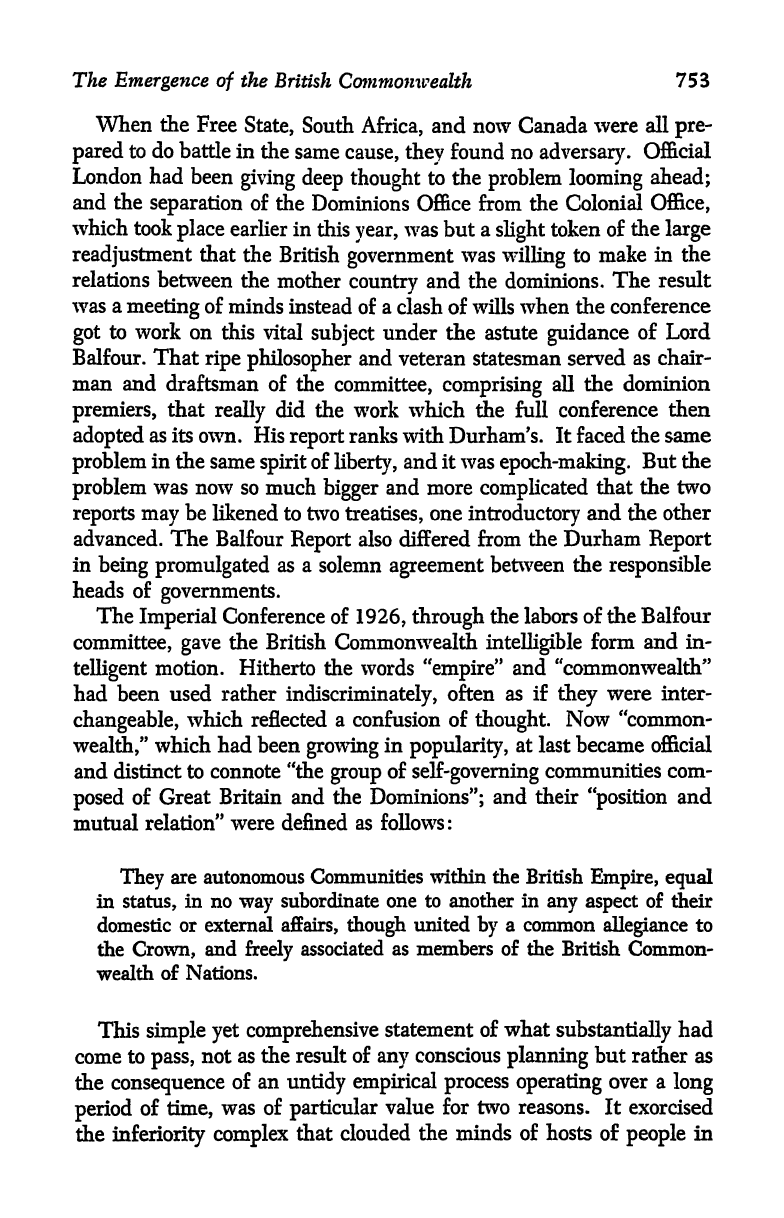
The
Emergence
of
the
British
Commonwealth
753
When the
Free
State,
South
Africa,
and now Canada
were
all
pre-
pared
to
do
battle in
the
same
cause,
they
found
no
adversary.
Official
London
had
been
giving
deep
thought
to the
problem
looming
ahead;
and
the
separation
of
the Dominions
Office
from the Colonial
Office,
which
took
place
earlier
in
this
year,
was
but
a
slight
token of
the
large
readjustment
that
the
British
government
was
willing
to
make
in the
relations
between
the
mother
country
and the dominions.
The
result
was a
meeting
of
minds
instead
of
a
clash of wills
when
the conference
got
to work on
this
vital
subject
under the astute
guidance
of
Lord
Balfour.
That
ripe
philosopher
and
veteran
statesman served
as
chair-
man
and draftsman
of the
committee,
comprising
all
the dominion
premiers,
that
really
did the
work
which
the
full
conference
then
adopted
as
its
own. His
report
ranks with Durham's.
It faced
the same
problem
in
the same
spirit
of
liberty,
and it
was
epoch-making.
But
the
problem
was now
so much
bigger
and more
complicated
that the two
reports
may
be
likened
to two
treatises,
one
introductory
and
the
other
advanced. The
Balfour
Report
also
differed
from
the
Durham
Report
in
being promulgated
as
a
solemn
agreement
between
the
responsible
heads
of
governments.
The
Imperial
Conference
of
1926,
through
the labors
of the Balfour
committee,
gave
the British Commonwealth
intelligible
form
and
in-
telligent
motion.
Hitherto
the words
"empire"
and "commonwealth"
had been
used rather
indiscriminately,
often
as if
they
were inter-
changeable,
which
reflected
a
confusion
of
thought.
Now "common-
wealth,"
which
had been
growing
in
popularity,
at
last
became
official
and distinct
to
connote "the
group
of
self-governing
communities
com-
posed
of
Great
Britain
and
the
Dominions";
and
their
"position
and
mutual relation"
were defined
as
follows:
They
are
autonomous Communities
within the
British
Empire, equal
in
status,
in no
way
subordinate one to
another
in
any
aspect
of their
domestic
or
external
affairs,
though
united
by
a
common
allegiance
to
the
Crown,
and
freely
associated
as members of
the British
Common-
wealth
of Nations.
This
simple
yet
comprehensive
statement
of what
substantially
had
come
to
pass,
not as
the
result of
any
conscious
planning
but rather
as
the
consequence
of
an
untidy empirical
process
operating
over a
long
period
of
time,
was
of
particular
value for two
reasons. It exorcised
the
inferiority complex
that
clouded
the
minds
of hosts
of
people
in
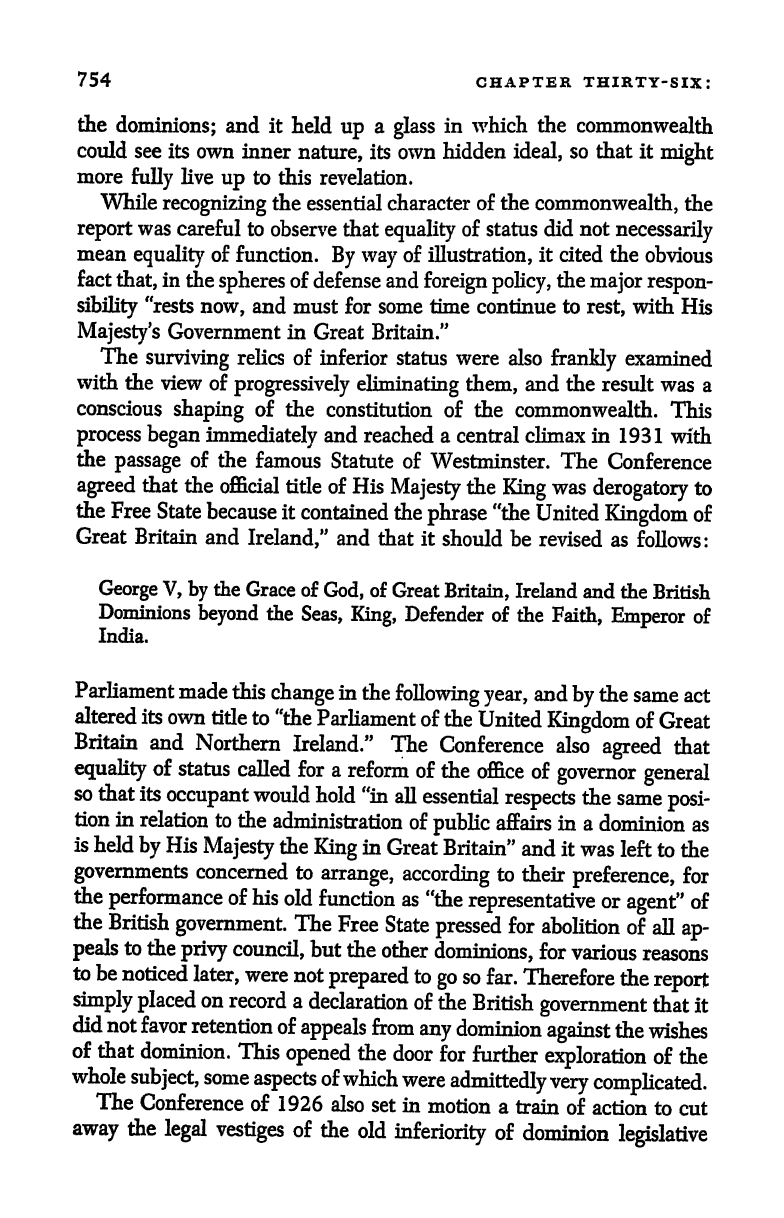
754
CHAPTER
THIRTY-SIX:
the
dominions;
and it
held
up
a
glass
in
which
the
commonwealth
could
see
its own
inner
nature,
its
own
hidden
ideal,
so
that
it
might
more
fully
live
up
to this
revelation.
While
recognizing
the essential character
of the
commonwealth,
the
report
was
careful to
observe
that
equality
of status did
not
necessarily
mean
equality
of
function.
By
way
of
illustration,
it
cited
the
obvious
fact
that,
in
the
spheres
of defense and
foreign
policy,
the
major
respon-
sibility
"rests
now,
and must for some time continue
to
rest,
with
His
Majesty's
Government in
Great Britain."
The
surviving
relics
of
inferior status
were
also
frankly
examined
with
the
view
of
progressively
eliminating
them,
and
the
result
was a
conscious
shaping
of the
constitution
of
the
commonwealth.
This
process
began
immediately
and
reached
a
central climax in
1931
with
the
passage
of
the
famous
Statute of
Westminster.
The
Conference
agreed
that
the
official
title of His
Majesty
the
King
was
derogatory
to
the
Free
State
because
it
contained the
phrase
"the
United
Kingdom
of
Great
Britain
and
Ireland,"
and
that
it
should be
revised as
follows:
George
V,
by
the
Grace of
God,
of
Great
Britain,
Ireland
and
the
British
Dominions
beyond
the
Seas,
King,
Defender
of
the
Faith,
Emperor
of
India.
Parliament
made
this
change
in
the
following
year,
and
by
the
same
act
altered its
own
tide
to
"the
Parliament
of
the
United
Kingdom
of
Great
Britain
and
Northern
Ireland."
The
Conference also
agreed
that
equality
of
status
called
for a
reform
of the
office
of
governor
general
so that
its
occupant
would
hold "in
all
essential
respects
the
same
posi-
tion in
relation to
the
administration
of
public
affairs in a
dominion as
is
held
by
His
Majesty
the
King
in
Great
Britain"
and it
was
left
to the
governments
concerned
to
arrange,
according
to their
preference,
for
the
performance
of
his
old
function as
"the
representative
or
agent"
of
the
British
government.
The
Free
State
pressed
for
abolition
of
all
ap-
peals
to
the
privy
council,
but the
other
dominions,
for
various
reasons
to
be
noticed
later,
were
not
prepared
to
go
so far.
Therefore
the
report
simply placed
on
record a
declaration
of the
British
government
that it
did
not
favor
retention
of
appeals
from
any
dominion
against
the
wishes
of
that
dominion.
This
opened
the
door
for
further
exploration
of the
whole
subject,
some
aspects
of
which
were
admittedly
very
complicated.
The
Conference
of
1926
also set
in
motion a
train
of
action
to cut
away
the
legal
vestiges
of
the
old
inferiority
of
dominion
legislative
